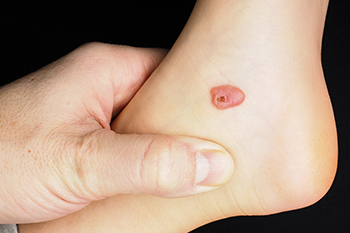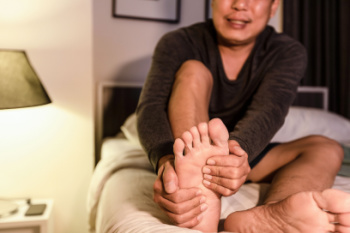Items filtered by date: August 2025
Causes of and Care for Foot Blisters

Friction blisters on the foot are fluid-filled sacs that form when repeated rubbing irritates the skin. They commonly develop in areas exposed to pressure or movement, such as the heels, toes, or soles. Causes include wearing ill-fitting shoes, walking long distances, or exercising without proper foot protection. Risk factors include moisture, heat, poorly cushioned footwear, and sensitive skin. Although often minor, untreated blisters can become painful or infected. A podiatrist can assess the blister, provide safe and sterile treatment to reduce discomfort, and recommend footwear or orthotics to prevent recurrence. If you experience frequent foot blisters or notice signs of infection, it is suggested that you visit a podiatrist for expert care and practical solutions to keep your feet healthy and protected.
Blisters are prone to making everyday activities extremely uncomfortable. If your feet are hurting, contact Larry J. Kipp, DPM of Coastal Podiatry Center. Our doctor can provide the care you need to keep you pain-free and on your feet.
Foot Blisters
Foot blisters develop as a result of constantly wearing tight or ill-fitting footwear. This happens due to the constant rubbing from the shoe, which can often lead to pain.
What Are Foot Blisters?
A foot blister is a small fluid-filled pocket that forms on the upper-most layer of the skin. Blisters are filled with clear fluid and can lead to blood drainage or pus if the area becomes infected.
How Do Blisters Form?
Blisters on the feet are often the result of constant friction of skin and material, usually by shoe rubbing. Walking in sandals, boots, or shoes that don’t fit properly for long periods of time can result in a blister. Having consistent foot moisture and humidity can easily lead to blister formation.
Prevention & Treatment
It is important to properly care for the affected area in order to prevent infection and ease the pain. Do not lance the blister and use a Band-Aid to provide pain relief. Also, be sure to keep your feet dry and wear proper fitting shoes. If you see blood or pus in a blister, seek assistance from a podiatrist.
If you have any questions, please feel free to contact our office located in New Port Richey, FL . We offer the newest diagnostic and treatment technologies for all your foot care needs.
How Rheumatoid Arthritis Can Affect Nerves in Your Feet

Rheumatoid arthritis is known for causing joint pain and inflammation, but it can also lead to nerve damage. Chronic swelling in the joints may compress nearby nerves, especially in the feet and ankles. This pressure can cause symptoms like tingling, numbness, burning sensations, or shooting pains, similar to peripheral neuropathy. Inflammation from rheumatoid arthritis may also directly damage nerves over time, interfering with how signals travel between your feet and brain. This can lead to changes in balance, walking difficulties, and sensitivity to touch. Treatment focuses on reducing inflammation and protecting joint and nerve health through medications, and wearing supportive footwear. If nerve-related symptoms begin or worsen, it is suggested you see a podiatrist for a thorough evaluation and personalized care plan.
Neuropathy
Neuropathy can be a potentially serious condition, especially if it is left undiagnosed. If you have any concerns that you may be experiencing nerve loss in your feet, consult with Larry J. Kipp, DPM from Coastal Podiatry Center. Our doctor will assess your condition and provide you with quality foot and ankle treatment for neuropathy.
What Is Neuropathy?
Neuropathy is a condition that leads to damage to the nerves in the body. Peripheral neuropathy, or neuropathy that affects your peripheral nervous system, usually occurs in the feet. Neuropathy can be triggered by a number of different causes. Such causes include diabetes, infections, cancers, disorders, and toxic substances.
Symptoms of Neuropathy Include:
- Numbness
- Sensation loss
- Prickling and tingling sensations
- Throbbing, freezing, burning pains
- Muscle weakness
Those with diabetes are at serious risk due to being unable to feel an ulcer on their feet. Diabetics usually also suffer from poor blood circulation. This can lead to the wound not healing, infections occurring, and the limb may have to be amputated.
Treatment
To treat neuropathy in the foot, podiatrists will first diagnose the cause of the neuropathy. Figuring out the underlying cause of the neuropathy will allow the podiatrist to prescribe the best treatment, whether it be caused by diabetes, toxic substance exposure, infection, etc. If the nerve has not died, then it’s possible that sensation may be able to return to the foot.
Pain medication may be issued for pain. Electrical nerve stimulation can be used to stimulate nerves. If the neuropathy is caused from pressure on the nerves, then surgery may be necessary.
If you have any questions, please feel free to contact our office located in New Port Richey, FL . We offer the newest diagnostic and treatment technologies for all your foot care needs.

